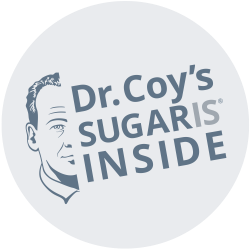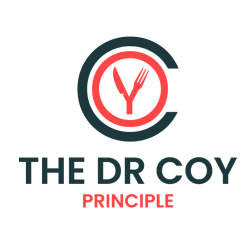An intelligent sugar strategy is the key to good health
Embracing a balanced and thoughtful approach to sugar consumption can enhance your overall well-being. In a world filled with dietary choices, selecting the right sugars is crucial. With Dr Coy’s Sugars, you can make an intelligent switch to your favourite recipes, without sacrificing sweetness.
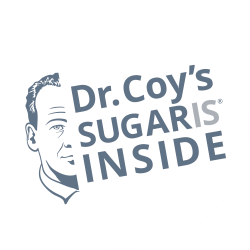

Get to know Dr Coy’s Sugars
Awareness of what we consume is at the heart of a healthy lifestyle. Dr Coy’s sugars provide you with an opportunity to make a positive change in your diet. These natural, ancient sugars are designed to offer the energy you need without the concerns often associated with conventional ‘classic’ sugars.
Whether you’re looking to replace or supplement your current sugar intake, Dr Coy’s sugars provide a versatile solution. By choosing Dr Coy’s sugars, you’re aligning yourself with a modern, health-conscious approach to eating. Experience the benefits of making the Intelligent Sugar Switch with Dr Coy’s sugars, and see how they can make a difference in your life.
Tagatose
Tagatose is a sweet, simple sugar (monosaccharide) with a very low glycaemic index and low-calorie content. Tagatose stabilises blood glucose levels. A small amount is absorbed in the small intestine, and the remainder is excreted or fermented in the large intestine by good bacteria.
Prevents high blood glucose levels
Low-calorie content and fat burning properties
Tooth-friendly
Low glycaemic index
Tastes even sweeter than classic sugar
Galactose
Galactose, is a simple sugar (monosaccharide) like glucose, but with a lower glycaemic index, which means it doesn’t lead to a fast blood glucose increase and blood sugar levels remain stable. Although it has the same calorie content as glucose, it uses more energy to process, so the actual calorie content is lower than normal sugar.
Switches on fat burning
Helps prevent premature memory loss
Tooth-friendly
Low glycaemic index
Keeps blood sugar levels stable
Isomaltulose
Isomaltulose is a natural double sugar (disaccharide) which consists of the same components as conventional household sugar – glucose and fructose – but has a lower glycaemic index. Isomaltulose prevents a strong blood glucose increase, enables a safe and extended delivery of energy to the body, and protects teeth from decay.
Prevents high blood glucose levels
Long-lasting energy
Tooth-friendly
Low glycaemic index
Tastes even sweeter than table sugar
Trehalose
Trehalose, is a natural double sugar (disaccharide) composed of two glucose molecules. Many plants, fungi, bacteria, and some insects use trehalose to protect proteins in their cells against protein damages – especially when extreme environmental conditions are present.
Prevents high blood glucose levels
Helps combat stress
Helps slow ageing by preventing cell damage
Low glycaemic index
Tastes just as sweet as table sugar
Ribose
Ribose is a simple sugar which forms the building blocks of DNA. It’s an essential component of adenosine triphosphate (ATP), which is the primary molecule that stores and transfers energy in our cells. It’s the least sweet sugar.
Prevents high blood sugar levels
Reduces muscle fatigue
Enhances energy levels
Negative glycaemic index
Tastes slightly sweet
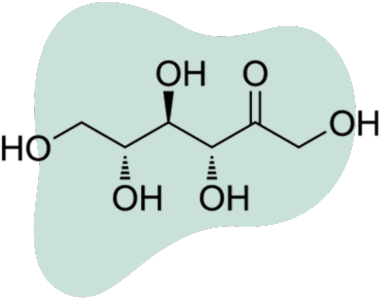
Allulose
Allulose is a naturally occurring rare sugar, also known as D-allulose or D-psicose. It’s found in trace amounts in foods such as figs, raisins, and maple syrup.
Prevents high blood sugar levels
Helps slow ageing by preventing cell damage
Low glycaemic index
Tastes just as sweet as table sugar
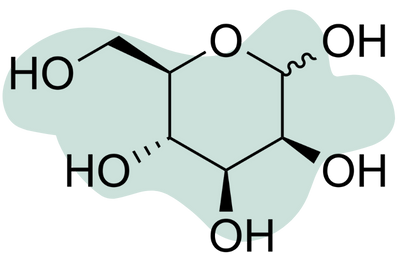
Mannose
Mannose is a simple sugar (monosaccharide) similar to glucose. It occurs naturally in various fruits such as cranberries, oranges, and apples, as well as in seeds and coffee beans. In the body, mannose plays a key role in the formation of glycoproteins — essential molecules involved in cell communication and immune function.
Improves efficacy of cancer treatments

Immunity Support with Anti-inflammatory Benefits
Promotes metabolic and gut health
Boosts mood and brain health
Getting to know the classic sugars
Too much classic sugar, combined with large amounts of glucose-based carbohydrates, bumps our daily sugar consumption, eventually damaging our health. When this is combined with a stressful and inactive lifestyle, our bodies are at greater risk of disease and faster ageing.
Glucose
Glucose:
Most of the glucose we consume comes from starchy carbohydrates like bread, pasta, rice, and potatoes. It’s also a component of many common sugar compounds, including:
- Sucrose (glucose + fructose, found in cane sugar and table sugar)
- Lactose (glucose + galactose, found in dairy products)
- Maltose (two glucose molecules joined together, found in malt sugar)
Too much glucose in our diet causes a spike in our blood sugar levels, promoting weight gain, chronic inflammation, and insulin resistance. Especially when you are stressed, your body craves carbs and sweets because the quick release of glucose triggers our brain’s reward pathways and temporarily suppresses cortisol. However, after the spike of glucose, your blood sugar levels crash – and the cycle of sugar craving starts again.
Effects on the body?
Our brains need sugar in the form of glucose, so an entirely sugar-free diet is not ideal. However, overconsumption of classic sugar and starch-rich foods can result in obesity, diabetes, early ageing, memory loss, and may increase the risk of cancer and other negative health problems.We recommend:
Swapping foods that contain glucose by implementing Dr Coy's sugars will help avoid these health challenges. Check out our recipes page for suggestions.Fructose
Fructose:
Our ancestors had limited fresh fruit options in winter and would eat as much as they could when it was available, to gain the fat needed for survival. Fructose is a sugar enabling the efficient building of fat deposits. Consumption of fructose rich fruits in late summer and autumn helped our ancestors to survive but nowadays we don’t use fat deposits to survive the winter. Dr Coy's sugars allow the reduction of fructose and its negative aspects, when combined with fruits and other desserts, yogurts, or smoothies.
Effects on the body?
Fruit is a healthy nutritional choice, but if we eat too many fruits or processed foods rich in fructose, it can still affect our waistlines and cause other health issues.Today we have access to fruit and fruit juices throughout the whole, instead of just during harvest seasons. Additionally, processed foods add an unnatural amount of fructose into our diet through man-made syrups.
For example, high-fructose corn syrup, made from corn starch, is a common additive in many processed foods since it is an inexpensive ‘bulk-sweetener’. However, high-fructose corn syrup contains 55% fructose, and can overload our bodies with too much fructose.
Lots of sauces, salad dressings, yogurts, and fizzy drinks have high amounts of fructose due to the addition of high-fructose corn syrup.
Most of the fructose we consume is sent to the liver to be converted into glucose. Then, our body uses it straightaway for energy or converts it into fat. However, when our diet is high in fructose, the liver gets overloaded and begins turning the fructose into large amounts of fat.
The adverse effects of consuming too much fructose include:- An increase in liver fat and reduced insulin sensitivity, which can lead to Non-Alcoholic Fatty Liver disease (NAFLD).
- Weight gain and risk of obesity.
- A risk of developing diabetes due to prolonged high blood sugar levels.
We recommend:
By adding Dr Coy's sugars to fruit drinks and smoothies you can reduce the amount of fructose you consume without sacrificing sweetness. Fresh fruit in our diet is important for nutritional benefits, but balance is key.
Fruit juices and dried fruits have a higher amount of fructose compared to fresh fruit, so it’s important to be aware of how much you are consuming. Look at food labels to see which foods contain high levels of added sugars.
There are lots of fruits with low amounts of sugar and low amounts of fructose. Berries like strawberries, currants, chokeberries, raspberries, blackberries, and blueberries are recommended.
Consider adding Dr Coy’s Sugars to your diet to maintain a healthy balance of sugar.
Sucrose
Sucrose:
We are all familiar with sucrose – we add it to teas and coffee and use it to bake cakes and pastries.
Most of the time we consume sucrose completely unconsciously, in fruit yoghurts, peanut butter, granola bars, breakfast cereals, - even savoury foods like condiments, sausages, and frozen ready meals.
Sucrose is often listed on food ingredient labels under many different names. Even if you don’t see ‘sugar’ on the ingredient list, it does not guarantee the item is a ‘healthier’ option.
Some of the common names for added sugar (containing sucrose) include beet sugar, golden syrup, carob syrup, and molasses.
The best way to ensure you’re not consuming excess sucrose is to make a habit of scanning the ingredient’s list of products before you purchase them.
Effects on the body?
Individuals consume an average of over 30kg of this type of sugar per year. High amounts of sucrose in your diet leads to prolonged high blood sugar levels. This strongly contributes to the onset of health conditions including obesity, diabetes, Alzheimer’s and cancer. Sucrose is also damaging to your teeth, it feeds the bad bacteria that causes bad breath, plaque and cavities.
We recommend:
Replacing classic sugar in our recipes and food choices with Dr Coy's sugars can help limit our overconsumption of sucrose.Lactose
Lactose:
Fermented milk products like yogurt, kefir and buttermilk are good options because they contain galactose, which helps with lactose digestion.Effects on the body?
Lactose intolerance is a common side effect of dairy consumption. Signs include an upset stomach, bloating, gas, headaches, fatigue and eczema. Fermented dairy products like buttermilk, kefir, yoghurt, cheese harbour low or very low amounts of lactose, because fermenting bacteria cleaves the lactose and prevents the lactose intolerance.We recommend:
Tagatose and galactose can be consumed by people suffering from a lactose intolerance, because they can be digested without lactase, the digestive enzyme which breaks down lactose. Adding galactose and tagatose to coffee instead of dairy milk and classic sugar supports healthy and comfortable digestion.Practical Solutions for Everyday Use
Seamlessly integrate healthier alternatives into your daily routine. Our ‘Solutions’ section sheds light on practical, everyday applications of Dr. Coy’s sugars. Discover how each unique sugar can elevate your culinary creations, benefit your health, and fit effortlessly into your lifestyle.
Incorporate
Dr Coy’s Sugars into your diet
Explore Dr Coy’s mouthwatering recipes to learn how you can create healthy meals and desserts.
Frequently Asked Questions
Get to know more about Dr Coy’s sugars by reading some of our most frequently asked questions.
Who is Dr Coy?
Dr Johannes Coy is a world-renowned scientist whose research focuses on the health benefits of sugar awareness. Dr Coy has made a number of important genetic discoveries which change our understanding of cancer and nutrition and make him the leading expert on sugars.
What is Intelligent Sugar?
Intelligent Sugar is a company founded by the world-renowned scientist Dr Johannes Coy. Our primary focus is to raise awareness about the benefits of Dr Coy’s sugars, such as tagatose, galactose, isomaltulose, and trehalose — which provide sweetness and added health benefits.
By replacing classic sugars with natural, health-promoting sugars, we can lead healthier lives without sacrificing on sweetness. We call this The Intelligent Sugar Switch.
Where can I buy Dr Coy's Sugars?
Using our patented technology and natural sugars, we help food & beverage companies implement an Intelligent Sugar strategy to create sweet, healthy products.
Learn more about our partners and the full range of products certified with Dr Coy’s Stamp of Approval.
Are Dr Coy's Sugars safe?
All of Dr Coy’s Sugars are naturally found in plants, fruits, milk, and honey. The health benefits of each sugar have been researched through peer-reviewed studies published by leading scientific journals. We have a full list of research and resources on Dr Coy’s Sugars, along with an easy-to-understand summary of each study.
